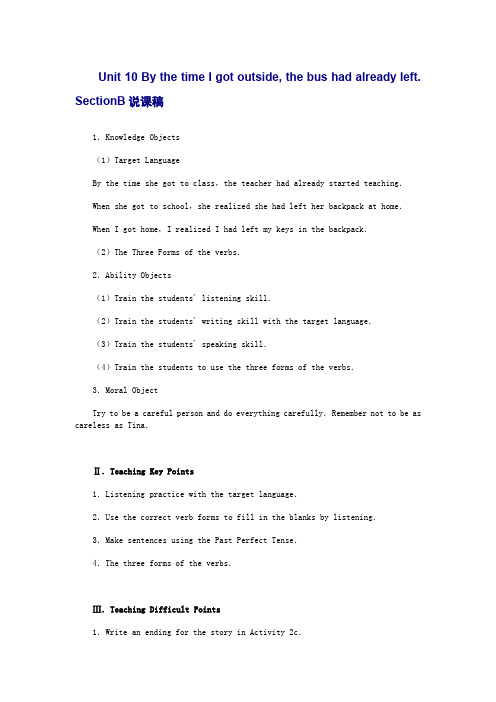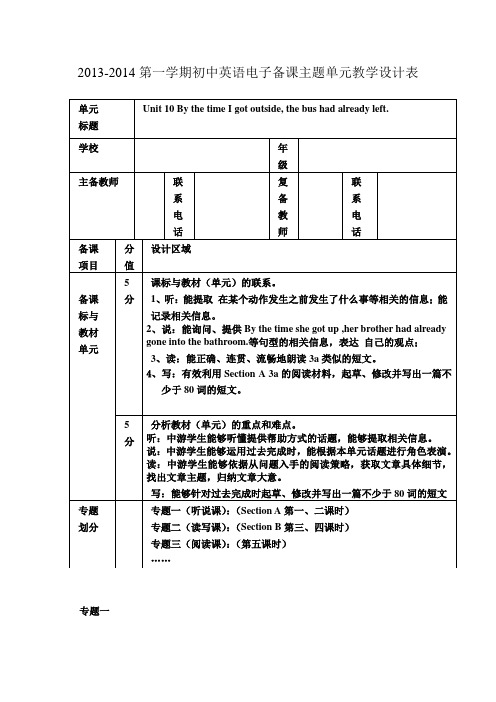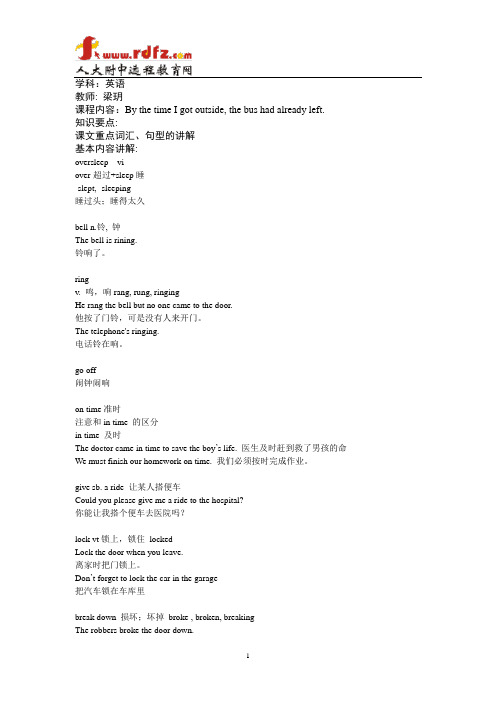九年级英语By the time I got outside,the bus had already left课件
九年级英语unit 10句型

UNIT 10句型1.当我出来时,汽车已经开走了。
By the time I got outside, the bus had already left.2.当我到达学校时,我意识到我把钥匙丢在了家里。
、When I got to school, I realized I had left my keys at home.3.他如此让人信任以至于数百人相信了这个故事。
He was so convincing that hundreds of people believed this story.4.当当局揭露这是个骗局,成千的人已经逃离了家园。
By the time the authorities revealed it was a hoax, thousands of people had fled from their homes.5.你和你的妻子结婚多久了?How long have you been married to your wife?(be married to sb.是延续性动词,可以和how long, for+一段时间连用)I have been married to my wife for ten years.6.由你决定。
Up to you.7.Jim 和Tom 的妈妈等一会将来我的办公室。
Jim and Tom’s mother is coming to my office in a moment.(两人共有的在第二人后加‘s)8.你打算去即将在Smith家举办的派对吗?Are you going to the party to be held at Smith’s home?(动词不定式作后置定语)9.太阳在东方升起,西方落下。
The sun rises in the east and sets in the west.。
人教版英语九年级Unit 10同步阅读(含答案)

新目标英语九年级Unit 10同步阅读(含答案)Unit 10 By the time I got outside, the bus had already left.1选择适合的词语完成下面的短文。
I’ve never been late for school, but yesterday I came very close. My alarm clock didn’t ___1___, and by the time I woke up, my father had already ___2___ into the bathroom and had to wait for him ___3___. I had to really rush, I took a quick shower, and had some breakfast, and them ___4___ to the bus stop. Unfortunately, by the time I got there, the bus had ___5___ left. I started walking, but I knew I can’t get to school ___6___ time. Luckily, my friend Tony and his dad came ___7___ in his dad’s car and they ___8___ me a ride. When I got to school, the final bell ___9___.I ___10___ made it to my class.( ) 1. A. go off B. turn off C. go on D. turn on( ) 2. A. been B. go C. gone D. went( ) 3. A. to e out B. ing inside C. to go outside D. getting into( ) 4. A. run off B. walked C. walk D. ran off( ) 5. A. never B. ever C. nearly D. already( ) 6. A. in B. at C. for D. on( ) 7. A. on B. at C. close D. here( ) 8. A. get B. gave C. give D. got( ) 9. A. was ringing B. rang C. rung D. had rung( ) 10. A. just only B. only C. only just D. just2根据短文内容选择最佳答案。
人教版九年级英语Unit 10 By the time I got outside, the bus had already left. SectionB说课稿

Unit 10 By the time I got outside, the bus had already left. SectionB说课稿1.Knowledge Objects(1)Target LanguageBy the time she got to class,the teacher had already started teaching.When she got to school,she realized she had left her backpack at home.When I got home,I realized I had left my keys in the backpack.(2)The Three Forms of the verbs.2.Ability Objects(1)Train the students' listening skill.(2)Train the students' writing skill with the target language.(3)Train the students' speaking skill.(4)Train the students to use the three forms of the verbs.3.Moral ObjectTry to be a careful person and do everything carefully.Remember not to be as careless as Tina.Ⅱ.Teaching Key Points1.Listening practice with the target language.2.Use the correct verb forms to fill in the blanks by listening.3.Make sentences using the Past Perfect Tense.4.The three forms of the verbs.Ⅲ.Teaching Difficult Points1.Write an ending for the story in Activity 2c.2.The three verb forms in Grammar Focus.Ⅳ.Teaching Methods1.Listening2.PairworkⅤ.Teaching AidsA tape recorderⅥ.Teaching ProceduresStep Ⅰ Revision1.Revise what happened to Tina in the morning by asking one or two students to tell the stroy on page 68.They may say like this:Tina had a bad morning.First of all she overslept.By the time she got up,her brother had already gotten in the shower.And by the time she went outside,the bus had already left.She had to run all the way to school.When she got to school,she realized she had left her backpack at home.All these made her look stressed out.After that,ask the whole class to work in pairs.telling the stroy and helping each other in turns.Remind them to use the correct verb forms.2.Ask students to check each other's homework in pairs,pointing out all the mistakes they might have made.3.Revise the Past Perfect Tense by asking the children when to use it and what its verb structure is.Step Ⅱ 2aThis activity provides guided listening practice using the target language.We have known Tina had a bad morning.But something worse happened to Tina later.Let's go to Activity 2a on page 69 and see what happened to Tina later in the morning.Read the instructions to the class.Be sure that all of them know what to do.Call the students' attention to the four pictures.Get them to guess the correct orderof the pictures first.The first one is given as a sample.Ask one or two children to tell their stories by describing the pictures according to their own order.Then,we will hear Tina talking about what happened to her after she got to school.We can see there is a small box in each picture.Please write a number from 1 to 4 in each box to show each picture's correct order.The first one has been given as a sample.Get the children to get ready to listen to Tina continue her story.Play the recording the first time,students only listen.Play the recording again and ask the children to number each picture.Check the answers with the class and see who have ever got the correct answers without listening.AnswersThe pictures should be numbered in this order:3 1 2 4TapescriptBoy:So then what did you do,Tina?Girl:Well,I ran home to get my backpack.But when I got home,I realized I had left my keys in the backpack.Boy:You're kidding!Girl :So I ran back to school without my keys or my backpack.And by the time I got back to school,the bell had rung.Boy:Oh,no!Girl:And by the time I walked into class,the teacher had started teaching already.She asked for our homework,but of course I didn't have it.Step Ⅲ 2bThis activity gives students practice in understanding and writing the target language.Ask the students to read the instructions together.Point out the blanks in the sentences and the verbs in the brackets.This activity has two parts.First let's fill in the blanks with the correct verb forms.We can see some verbs in the brackets.They are the base forms of the given verbs.For example,get and got,Get is the base form of the verb.Your job is to write the correct forms of these verbs in the blanks.Look at number one.A sample answer is given.Let the students fill in the blanks with the correct forms individually.Move around the classroom collecting the common mistakes they may make.After they all finish writing,tell them to get ready to listen to the conversation and check their answers.I will play the recording again.Please check your answers and correct any mistakes you might have made while listening.Play the recording.Students listen and check their answers.Correct the answers by asking seven different students to say theirs to the class.Answers1.got home 2.realized 3.had left 4.got 5.had rung 6.walked 7.had startedStep Ⅳ 2cThis activity gives students oral practice with the target language.Ask the whole class to read the instructions together.We have a new task now.We know Tina was late for class.What do you think happened after Tina was late for class Work with a partner.Make up an ending for the story by continuing it.The beginning has been given.Get students to discuss in pairs,Complete the ending.Make sure they are talking in English.Move around the classroom,offering language support if needed.After ten minutes,ask students to stop discussing.Get some pairs of students to tell the class how they think the story ended.And let the whole class decide whose ending is the best.Tell each pair to write down their ending,or do it after class if time is not enough.Sample ending of the storyThe teacher looked at Tina and said,“Why are you late and where is your homework,Tina?”“I had a bad morning today.”Tina said sadly.“I'm sorry to hear that,but may I know what happened?”said the teacher.Then Tina told the teacher and the whole class her story.All her classmates laughed loudly after it.Some of them said,“Poor Tina!”Bob,one of Tina's classmates,stood up and said,“Well,Tina,I'd love to help you.Why not let me keep the keys for you?I would put your keys in my backpack.”Step Ⅴ Grammar FocusThis activity introduces the target language of this unit.Call students' attention to the sentences on the left.Ask four different students to read the foursentences and point out where had plus a past participle is used.Write the sentences on the blackboard.Draw a simple time line for each sentence to help students to understand the grammar focus.For example:Then get the students to look at the box.Teach students to read the three forms of each verbs first.Then ask several students to read the verbs to the class to see if they can read.Write the verbs on the blackboard.Ask the students to make sentences correctly using each form of the verbs in the box.For example:I usually get up at 6:30.I got up at 5:30 yesterday.By the time I got up,my sister had already gotten in the shower.Tell the students when we talk about the first thing that happened.We use had plus a past participle (had gotten)and when we talk about the second thing that happened,we use the simple past tense (got up).Ask some to read their sentences to the class.Ask the students to make their own lists of other verbs used in this unit.Tell them to put the lists in their notebooks using a three-column format like the one in the Look! section.The lists have to include these verbs: leave,walk,start,oversleep,ring,be.Check the answers.Some sample sentences with the three verb forms1.I got up at 6:30 every day.I got up at 6:00 yesterday.By the time I got up,my sister had already gotten in the shower.2.We usually go to school at 7:30.We went to school at 8:30 yesterday.By the time we got to the classroom,the students had gone to the chemistry lab.3.My father leaves home at 8:30.He left home at 9:30 this morning.When my father went outside,the bus had left.4.The teacher often starts teaching at 9:00.The teacher started teaching at 8:30 the day before yesterday.When Tina got to class,the teacher had already started teaching.The three forms of the verbs used in this unit:leave left leftwalk walked walkedstart started startedoversleep overslept oversleptring rang rungbe was/were beenStep Ⅵ SummarySay,In this class,we've done much listening and writing practice with target language.We've also done some oral practice in pairs.And we've discussed the Grammar Focus of this unit.Step Ⅶ Homework1.Write down the ending of Tina's story.2.Make sentences using each form of the verbs below:leave,walk,start,oversleep,ring,be3.Review the Grammar Focus.Step Ⅷ Blackboard DesignUnit 10 By the time I got outside, the bus had already left. 复习课实录T: Good afternoon, class.Ss: Good afternoon, Miss li.T: Sit down , please.Ss: Thank you.T: Today we’ll revise Unit 10. Let’s read the title twice.The teacher shows the title on the computer. The students read the title twice.T: As usual, we can work in groups and tell your partners what other things you thought according to the main points in this unit.The students work in groups and discuss. The teacher walks around the classroom to offer some help.T: Let’s stop here. Look at the screen and we begin to check the main phases.The teacher show the main phases on the computer. The students look at the phases and speak in English. The first four answer together. Then ask some individuals to ask.1.闹响2.把…忘在…3.忘记做…4.成功做到5.等待某人做某事6.让某人搭便车7.用车接8.穿衣给某人穿衣9.出席10.成百上千的11.结婚12.和某人结婚13.激起14. 熬夜15.出故障16.经过T: Now let’s read the phrases together.The students read them twice.T: So much for phrases. Let’s revise the Grammar. What tense did we learn in this unit?Ss: 过去完成时T: Let’s revise something about it.1. 构成: had +V过分2. 过去完成时态的含义:主要是表示在过去某个时间,或是动作之前已经发生或完成的动作.也就是:过去的过去.过去完成时态的用法:1、表示过去的过去,通常由when或by引导的短语或者从句做时间状语或时间状语从句①By the end of last year, I had learned about one thousand English words. (时间提示)②When I got there, they had already left. (动作提示)2、常用在宾语从句中①He told me he had already finished his homework.②I realized he had fooled me again。
九年级英语Unit 10 By the time I got outside, the bus had already left.教学设计(4课时)

2013-2014第一学期初中英语电子备课主题单元教学设计表专题一单元 标题 Unit 10 By the time I got outside, the bus had already left.学校 年级主备教师联系电话复备教师联系电话备课项目 分值 设计区域备课标与教材单元5分课标与教材(单元)的联系。
1、听:能提取 在某个动作发生之前发生了什么事等相关的信息;能记录相关信息。
2、说:能询问、提供By the time she got up ,her brother had already gone into the bathroom.等句型的相关信息,表达 自己的观点;3、读:能正确、连贯、流畅地朗读3a 类似的短文。
4、写:有效利用Section A 3a 的阅读材料,起草、修改并写出一篇不少于80词的短文。
5分 分析教材(单元)的重点和难点。
听:中游学生能够听懂提供帮助方式的话题,能够提取相关信息。
说:中游学生能够运用过去完成时,能根据本单元话题进行角色表演。
读:中游学生能够依据从问题入手的阅读策略,获取文章具体细节,找出文章主题,归纳文章大意。
写:能够针对过去完成时起草、修改并写出一篇不少于80词的短文专题划分专题一(听说课):(Section A 第一、二课时) 专题二(读写课):(Section B 第三、四课时) 专题三(阅读课):(第五课时) ……备学情15分教法或学法:教师通过幻灯片展示S、P. 让小组交流、展示、PK 、评价使学生进行流利、准确或基本三个层次的练习。
教师积极评价。
教师引起学生兴趣的切入点:通过让学生谈论自己过去曾发生的一些有趣的事情,使学生引起学生的兴趣。
学生乐于交流参与。
备教学目标5分语言知识与语言技能目标:能够理解领悟所有单词、词组的基本含义,以及某些单词在特定语境中的意义,并能正确、熟练运用重点单词、词组;能够运用所学重点词汇、重点短语、重点语言结构句型描述提供帮助方式。
九年级英语Unit10 By the time I got outside,the bus had already left.讲解及练习

第 1 页 (共4 页) 第 2 页 (共4 页)学校 姓名 班级 考场 考号---------------------------------○密------------------ -------------------○封----------------------------- -- --○线----------------------------※※※※※※※※※※※※※※※答※※※※※※※※※※※※※※※※※※题※※※※※※※※※※※※※※※※线※※※※※※※※※※※※※九年级英语Unit10 By the time I got outside,the bus hadalready left.讲解及练习1. 过去完成时(1) 构成:由助动词had + 过去分词 构成 否定式:had not + 过去分词 缩写形式:hadn‘t (2) 用法 过去完成时表示在过去某一时间或动作之前已经发生或完成了的动作。
(3) 它所表示的时间是―过去的过去‖。
①表示过去某一时间可用by, before 等构成的短语来表示②也可以用when, before, after 等引导的时间状语从句来表示 ③还可以通过宾语从句或通过上下文暗示。
When I got there, you had already eaten you meal. 当我到达那里时,你已经开始吃了。
By the time he got here, the bus had left. 到他到达这里时,汽车已经离开了2. by the time 直到…时候 指从过去某一点到从句所示的时间为止的一段时 如: By the time we got to his house, he had finished supper. 在我们到达他就已经吃完了晚饭。
3. 英语中表示―把某物遗忘在某处‖常用 leave + 地点 而不是forget+地点 如:Unluckily, I left my book at home . 不幸的是,我把书忘在家里了。
人教版九年级英语unit10知识点,单词讲解

人教版新目标英语9年级讲解-Unit 10 Unit 10 By the time I got outside,the bus had already left. 重点、难点、考点及疑点注释重点、难点、考点及疑点注释1. When I got to school, I realized I had left my backpack at home. (P76)我到学校时才发现把书包落在家了。
我到学校时才发现把书包落在家了。
(1)had left my backpack at home 这是一个过去完成时的句子,这是一个过去完成时的句子,表示在过去某一时间或表示在过去某一时间或某一动作之前完成的动作或存在的状态。
某一动作之前完成的动作或存在的状态。
By three o’clock yesterday afternoon we had finished the work.到昨天下午三点,我们已经完成了工作。
到昨天下午三点,我们已经完成了工作。
She had learned a lot of English before she went to school. 在上学之前,她已经学会了很多英语。
在上学之前,她已经学会了很多英语。
(2)left 是leave 的过去式,在此处意为“遗忘”,“忘记”,后面常有地点状语。
,后面常有地点状语。
Li Min left his dictionary in the reading-room yesterday. 昨天李民把词典忘在阅览室里了。
昨天李民把词典忘在阅览室里了。
特别提示特别提示forget 作“遗忘”解时,后面没有“遗忘”的地点。
作“遗忘”解时,后面没有“遗忘”的地点。
I have forgotten the book. 我忘记拿书了。
我忘记拿书了。
2. My alarm clock didn’t go off, and by the time I woke up, my father had already gone into the bathroom and I had to wait for him to come out. (P78)我的闹钟坏了,因此等我醒来的时候,我父亲已经进去洗澡了,我只好等他出来。
九年级英语by the time i got outside,the bus had already left练习题3

Unit 10 By the time I got outside,the bus had already left.温故知新(课前复习类训练)●Word recycling and grammar reviewing(旧词循环和语法复习)Ⅰ.Write down the correct form of the word according to the request.(根据要求写出单词的相应形式。
)1.teach(名词)______________2.leave(过去式) ______________3.reply(同义词) ______________4.realize(现在分词) ______________5.forget(过去分词) ______________6.early(比较级)______________7.final(副词) ______________ 8.ring(过去分词) ______________9.dress(第三人称单数形式) ______________ 10.really(形容词) ______________答案:1.teacher 2.left 3.answer 4.realizing 5.forgotten 6.earlier7.finally8.rung 9.dresses10.realⅡ.Fill in the blank with the right word form.(用单词的适当形式填空。
)1. _________they_________(get)to the farm on time last Monday?2.You can finish the work_________(easy).3.I _________never_________(be)late for school.4.you ever_________(forget)a relative’s birthday?5.They gave me a_________(ride)on the way to school.答案:1.Did,get由last Monday可知应用一般过去时。
By the time I got outside, the bus had a...

学科:英语教师:梁玥课程内容:By the time I got outside, the bus had already left.知识要点:课文重点词汇、句型的讲解基本内容讲解:oversleep viover-超过+sleep睡-slept, -sleeping睡过头;睡得太久bell n.铃, 钟The bell is rining.铃响了。
ringv. 鸣,响rang, rung, ringingHe rang the bell but no one came to the door.他按了门铃,可是没有人来开门。
The telephone's ringing.电话铃在响。
go off闹钟闹响on time准时注意和in time 的区分in time 及时The doctor came in time to save the boy’s life. 医生及时赶到救了男孩的命We must finish our homework on time. 我们必须按时完成作业。
give sb. a ride 让某人搭便车Could you please give me a ride to the hospital?你能让我搭个便车去医院吗?lock vt锁上,锁住lockedLock the door when you leave.离家时把门锁上。
Don’t forget to lock the car in the garage把汽车锁在车库里break down 损坏;坏掉broke , broken, breakingThe robbers broke the door down.强盗们把门砸开了。
break down 也有抛锚的意思Our truck broke down outside town.我们的卡车在城外抛锚了。
costumen. 服装;全套服装Her national costume showed which country she came from.她的民族服装表明了她是从哪个国家来的。
- 1、下载文档前请自行甄别文档内容的完整性,平台不提供额外的编辑、内容补充、找答案等附加服务。
- 2、"仅部分预览"的文档,不可在线预览部分如存在完整性等问题,可反馈申请退款(可完整预览的文档不适用该条件!)。
- 3、如文档侵犯您的权益,请联系客服反馈,我们会尽快为您处理(人工客服工作时间:9:00-18:30)。
Ⅳ. Teaching Arrangement.
Step1. Warming up. A: Sing an English song. B: Review every day events with the help of pictures.
⑵.Ability Goals.
A: Enable the students to tell the differences between Present Perfect Tense and Past Perfect Tense. B: Enable the students to express events in the Past Perfect Tense freely.
⑶.Emotional Goals.
By learning Past Perfect Tense in the real condition, the students will experience the interest in lives, they can develop their team spirit and take an active part in English activities by using certain target language.
Tina’s morning
she overslept / slept a long time
By the time she got up, her brother someone was taking a shower had already gotten in the shower.
By the time she got outside, the already the bus hadbus leftleft
The Past Perfect Tense 过去完成时
1.Had + past participle form
2.主要是表示在过去某个时间,或是 动作之前已经发生或完成的动作. 也就是过去的过去. 过去的过去.
A: Key vocabulary:
by the time. oversleep overslept overslept get got gotten go went gone leave left left start started started
B: Target language:
What happened? I overslept. And by the time I got up. My brother had already gotten in the shower. By the time I got outside, the bus had already left.
she was running quickly
When she got to school, she realized left her her backpack home she had leftbackpack at at home.
Step3. Grammar Focus.
Say something about the Past Perfect Tense, give students a clear explaination.
A: Talk about students’daily lives in Past Tense ’ and Present Perfect Tense. B: Master Past Perfect Tense and learn to use it.
3. Teaching and learning difficulties.
Ⅱ. Analysis of the students.
1. Students’ background knowledge. 2. Students’ cognitive features. 3. Students’ need.
Ⅲ. Teaching, learning skills and methods.
A: Distinguish Past Perfect Tense from Past Tense and Present Perfect Tense. B: Describe activities in Past Perfect Tense.
4. Teaching Goals.
⑴.Cognitive Goals.
What do you usually do in the morning?
go to school
Step2: Leading in
Show Tina's morning on the screen,
with the help of these pictures, teach new words and target languages.
英语:Unit10 Section A 课件ppt(新目标九年级下)
The Teaching Design of Section A Unit 10 in Go for It Grade 9
Yang Jie
Xiangfan No.23 Middle School
Ⅰ. Description of the Teaching Contents. 1. Analysis of the Teaching Material. 2. Key pointually do in the morning?
brush my teeth
What do you usually do in the morning?
take a shower
What do you usually do in the morning?
have breakfast
